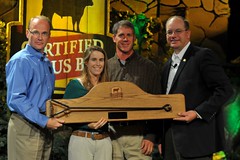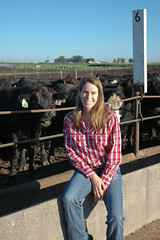Every time that I take a “personality” or “strength’s finder” test, I come back labeled as an achiever. Although I have a tremendous interest in psychology and how the brain works, I am also very analytical with a natural tendency to measure progress. Add into the equation a bit of competitiveness, and you have a pretty good description of Anne.
I graduated Salutatorian from Cardinal Newman High School and Cum Laude from Dartmouth College not because I was the smartest kid in the class, but because I was likely the most focused and dedicated. My girls laugh that “Mama has a gold star on her college diploma because she studied a lot. Daddy doesn’t because he drank too much beer…”
Sixteen years into my professional life, my achiever personality is stronger than ever. One of my favorite tasks as a feed yard manager is to fine tune both our animal care/management practices and also the quality of the beef that our animals produce. The Progressive Beef program provides me with a great tool to measure and assess our daily animal care practices, and using a Grid to market my cattle at harvest time provides an excellent report card for beef quality. The sustainability of my farm is intrinsically linked to my success on these two report cards!

The care that I offer to my animals plays an important role in the quality of the beef that they make…
Those of you who have followed Feed Yard Foodie for a long time will remember the long series of Calf #718 posts where I traced an animal all throughout its lifetime. (These posts are archived together in a category on the right hand side of the home page if you missed them and would like to read them all!) At the end of the series, Calf #718 was shipped to the packing plant, and I received a report card in the form of Grid carcass data on the animal. Today, I send my animals to a different packing plant than Calf #718 went to, but I still harvest them on a grid basis like the one explained in the post linked above.
I not only receive carcass data on every animal that I ship, but I also get paid relative to the quality of the beef that comes from that animal. In other words: the higher the quality of beef, the better the report card, and ultimately the more money that I receive from the packing plant. Because I trace the vast majority of my animals from birth to harvest year after year, I am able to challenge myself to constantly improve the beef that is raised on my farm.
It is my job to set my animals up for success so that they can reach their God-given potential to make deliciously tender and healthy beef. If I put all of the pieces of the puzzle together correctly: high quality animal genetics, outstanding care/welfare, and judicious use of technological tools; then my cattle thrive and produce the kind of mouth-watering beef that I love to serve to my family.
I am a firm believer that you must measure in order make improvements. Report Cards are tremendous management tools because they provide vital benchmarking information. Every time that I ship a pen of cattle to the packing plant, I eagerly await the report card that comes a few days later. With this information, I can assess the quality of the job that I did preparing my animals to become beef. Then, I can use that data to strive for future improvements relative to animal care and performance.
It is a like a dream come true for an natural achiever like me!















